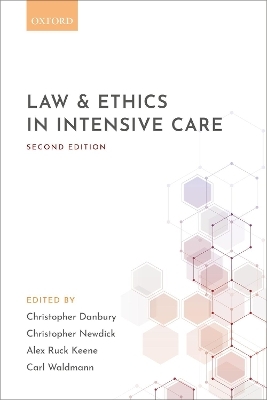
Law and Ethics in Intensive Care
Oxford University Press (Verlag)
978-0-19-881716-1 (ISBN)
The practice of intensive care medicine raises multiple legal and ethical issues on a daily basis, making it increasingly difficult to know who to admit and when, at what stage invasive management should be withdrawn, and who, importantly, should decide? These profound dilemmas, already complicated in a setting of scarce resources, mandate an understanding of law and ethics for those working in intensive care medicine.
Clinically focused, this book explains the relevance of landmark rulings to aid your day-to-day decision-making. A spectrum of ethical and legal controversies in critical care are addressed to demonstrate how law and ethics affects the care available to patients and vice versa.
Discussion of conflict resolution advises the options open to you when agreement on treatment decisions or withdrawal cannot be reached. The literature and variations surrounding Do Not Attempt Resuscitation decisions are outlined to help you navigate this complex area. This edition also provides an up-to-date analysis of issues such as futility and depreciation of liberty.
Featuring contributions from leading legal and medical experts, this important reference should be read by every critical care professional.
Dr Christopher Danbury is a Consultant Intensive Care Physician at the Royal Berkshire Hospital. With almost 30 years of experience as a Doctor, he graduated from St George's Hospital Medical School in 1990, before switching his focus to intensive care medicine. In 2002, Dr Danbury was appointed a consultant intensive care physician in one of the busiest District General Hospital Intensive Care Units in England. His research work focuses on bio-legal research, particularly decision making in the critical care unit. In 2005, Dr Danbury was appointed as Visiting Fellow in Health Law at the School of Law at the University of Reading, a post he still holds. He is an experienced expert witness, giving oral evidence regularly in the Court of Protection. Chris Newdick is the Professor of Health Law at the University of Reading. He is an advisor to the Thames Valley Priorities Committee, has served on the Medicines Commission and was a member of the Independent Review of Individual Patient Funding Requests in Wales. He is the author of Who Should We Treat? - Rights, Rationing and Resources. Alex is a barrister at 39 Essex Chambers specialising in mental capacity and mental health law. He also writes extensively, has numerous academic affiliations, including as Visiting Lecturer and Wellcome Research Fellow at King's College London, and created the website www.mentalcapacitylawandpolicy.org.uk. Carl Waldmann is Consultant in ICM and Anaesthesia at the Royal Berkshire Hospital in Reading and Dean of the Faculty of Critical Care. Apart from his interests in the management of Head Injured patients in a DGH, the procurement and implementation of a Clinical Information System in ICU, his passion has been setting up and running an ICU follow-up clinic in Reading. From May 2007 to May 2009 he was President of the ICS, editor of Care of the Critically Ill and until 2004 the editor of JICS. Carl was also Chair of the section of Technology Assessment and Health Informatics [TAHI] of the ESICM until 2008. He was a member of the PACT editorial board of the ESICM and between 2015 and 2018 served as the Treasurer for the ESICM. Carl also has an interest in pre-hospital care and is club doctor for Leyton Orient FC.
Section A: Listening to Patients
1: Dominic Bell: Consent for Intensive Care: Public and Political Expectations vs. Conceptual and Practical Hurdles
2: Alex Ruck Keene and Zoë Fritz: Refusing and Demanding Medical Treatment in Intensive Care
3: Hazel Biggs: DNAR: to Resuscitate or not to Resuscitate? Rights, Wrongs, Ethics and the Voice of the Patient
Section B: Listening to Doctors, Parents, and Relatives
4: Thérèse Callus: Spanner in the Works or Cogs in a Wheel? Parents and Decision-making for Critically Ill Young Children
5: Daniele Bryden: Adults who Lack Capacity to Consent and Deprivation of Liberty
6: Christopher Newdick and Christopher Danbury: Promoting the Best Possible Death - Futility in Terminally Ill Patients Who Lack Capacity
7: Dale Gardiner and Andrew McGee: Diagnosing Death
Section C: External influences
8: John Coggon and Louise Austin: Doing What's Best: Organ Donation and Intensive Care
9: Carl Waldmann, Neil Soni, and Andrew Lawson: Conflicts of Interest
10: Rosaleen Baruah: Social Media Pressures in Intensive Care
11: Christopher Danbury, Christopher Newdick, Alex Ruck Keene, and Carl Waldmann: Pandemic Planning after Covid-19
| Erscheinungsdatum | 03.01.2020 |
|---|---|
| Verlagsort | Oxford |
| Sprache | englisch |
| Maße | 162 x 234 mm |
| Gewicht | 420 g |
| Themenwelt | Medizin / Pharmazie ► Gesundheitswesen |
| Medizin / Pharmazie ► Medizinische Fachgebiete ► Intensivmedizin | |
| Medizin / Pharmazie ► Medizinische Fachgebiete ► Medizinethik | |
| Studium ► Querschnittsbereiche ► Geschichte / Ethik der Medizin | |
| ISBN-10 | 0-19-881716-9 / 0198817169 |
| ISBN-13 | 978-0-19-881716-1 / 9780198817161 |
| Zustand | Neuware |
| Informationen gemäß Produktsicherheitsverordnung (GPSR) | |
| Haben Sie eine Frage zum Produkt? |
aus dem Bereich


